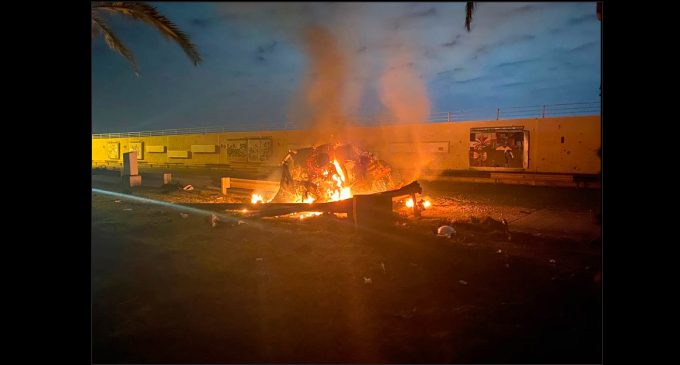Trump’s U.S. airstrike sparks tensions
U.S. airstrike kills Qassem Soleimani, commander of Iran’s Quds Force.

By Algenon Cash
Qassem Soleimani, an Iranian major general in the Islamic Revolutionary Guard Corps and commander of its Quds Force, was killed in a targeted U.S. drone strike on January 3 in Baghdad, Iraq. President Donald Trump approved the military action under the justification that Soleimani posed an “imminent threat” to American lives and overseas interests.
Soleimani is alleged to have handled clandestine activities outside Iran; led powerful Shiite militias embedded in Iraq and encouraged his allies to attack U.S. targets in the country. The Trump Administration also believes that Soleimani supplied militia commanders with sophisticated new weapons, including Katyusha rockets, shoulder-fired missiles, and a specialized drone capable of eluding radar systems.
Iran’s influence in the region has grown exponentially as the country fought alongside Americans to defeat ISIS, but lately Iraqis have been staging mass protests against the Islamic Republic. Soleimani hoped to reverse the tide by attacking American forces and provoking a military response that would redirect the rising protests toward the United States.
The Pentagon and CIA described Soleimani as “the single most powerful operative in the Middle East today” and the central strategist in Iran’s effort to promote the expansion of Shiite influence throughout the region. Most Iranians regarded Soleimani as the second most powerful official in Iran after Supreme Leader Ayatollah Ali Khamenei.
Former Central Command Commander and CIA Director David Petraeus called the killing of Qassem Soleimani “bigger than the death of Osama bin Laden.”
One crown jewel of the Obama legacy is negotiating the Joint Comprehensive Plan of Action, more commonly known as the 2015 nuclear deal with Iran, which required Iranians to cut or eliminate its stockpile of enriched uranium, reduce the number of centrifuges that could be used to further enrich uranium for nuclear weapons, and agree not to construct additional facilities.
Trump withdrew the United States from JCPOA in May 2018.
Later in the same year, Trump imposed a fresh round of sanctions against Iran to cripple the country economically and prevent its support for militant groups in the region. In April 2019, Trump officially designated the Revolutionary Guards a terrorist organization; the group has around 125,000 military personnel engaged in ground, air, and naval activity.
Tensions have continued to rise between Iran and America – Iranian supported Shiite militias launched four rockets at a base near Baghdad International Airport that wounded five members of Iraq’s Counter-Terrorism Service, then Shiite militias attacked the K-1 Air Base in Iraq, killing an American contractor and wounding four Americans. The U.S. responded by launching airstrikes across Iraq and Syria, killing 25 and wounded 55 Kataib Hezbollah militiamen. Days later the same militia attacked the U.S. embassy in Baghdad.
The latter action resulted in Trump considering a stronger and more extreme response to Iran’s provocations. Ultimately deciding the rewards outweighed the risk of removing a high level figure, a MQ-9 Reaper drone attacked Soleimani’s convoy after shortly arriving at Baghdad International Airport. The operation killed 10 people, including Soleimani and his chief ally Abu Mahdi al-Muhandis.
This was the first time the U.S. killed a major military leader since American pilots shot down the plane of Japanese Admiral Isoroku Yamamoto in World War II.
Trump’s quick lurch to lethal military action was unexpected. It is anticipated that taking out a high value target could only stoke rising tensions in the region. Trump grew motivated to seek options to severely damage Iran’s enlarging influence campaign.
Administration and Pentagon officials were stunned Trump chose such a strong-handed response to Iranian-led violence in Iraq, with Congress frustrated about POTUS not seeking their approval to conduct a military exercise targeting a top foreign leader.
Trump defended the airstrike by stating the intelligence community gathered data revealing Soleimani was involved in planning imminent attacks targeting Americans in Iraq, Syria, and Lebanon. But little concrete evidence has been shared with Congressional leaders, international partners, media, or the American people.
The Obama Administration designated Soleimani a terrorist in 2011 after accusing the general of a plot to kill the ambassador of Saudi Arabia. Trump compares the military response against Soleimani to actions taken by the Obama administration to kill Osama bin Laden and Muammar Gaddafi.
Reactions to the fatal airstrike have been swift – Iran has vowed a “forceful” revenge against U.S. assets in the region, they have withdrawn from JCPOA, and mobilized ballistic missiles across the country. The Iraqi government approved a resolution (170-0) to eject the U.S. military from their country – Shiite lawmakers drafted the language and led the vote with Sunni and Kurdish factions abstaining.
Trump quickly promised to strike 52 sites across Iran if they attack Americans or American interests overseas. He even went one step further, declaring cultural sites would be included on the list, which is a war crime. Around 3,500 soldiers at Fort Bragg have been deployed to the region.
Some pundits argue Trump’s tough response may lead us into a new major conflict in the Middle East and even predictions of another world war have been leisurely thrown around.
America has invested trillions in Middle Eastern conflicts and most would argue the country is in no position to continue wasting dollars or American lives in the region. The most informed military aides capable of advising Trump on restraint and effective planning no longer work in the administration – Mattis, Kelly, and McMaster – all resigned or have been pushed out.
Trump will need well-informed expert advice to navigate this mounting crisis while averting further conflict with Iran and their allies. Any POTUS is justified when they respond to threats against the American people, but the response must be commensurate to the action – no one doubts Trump should have responded, but only time will tell if his response was appropriate.
Algenon Cash is a nationally recognized speaker and the managing director of Wharton Gladden & Company, an investment banking firm. Reach him at acash@algenoncash.com.















